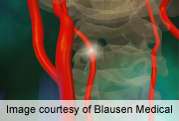Frequent prior hospitalization may predict stroke readmission

(HealthDay)—Frequent prior hospitalization and National Institutes of Health Stroke Scale (NIHSS) rating at admission may predict 30-day readmission after ischemic or hemorrhagic stroke, according to a study published online June 11 in the American Journal of Medical Quality.
Roy E. Strowd, M.D., from the Wake Forest School of Medicine in Winston-Salem, N.C., and colleagues retrospectively compared 79 cases readmitted to the same hospital within 30 days of acute stroke and 86 frequency-matched controls to identify factors associated with readmission.
The researchers found that readmitted patients were more likely to have > 2 hospitalizations in the year prior (21.5 percent versus 2.3 percent in controls, P < 0.001), congestive heart failure, coronary artery disease, cancer, acute renal failure, pneumonia, urinary infection, and absence of hyperlipidemia. Admission NIHSS (OR, 1.072 per 1-point increase; P = 0.005), prior hospitalizations (OR, 2.205 per admission; P < 0.001), and absence of hyperlipidemia (OR, 0.444; P = 0.023) were independently associated with readmission in multivariate modeling.
"If validated, these characteristics identify high-risk patients and focus efforts to reduce readmission," the authors write.
Several authors disclose ties to the pharmaceutical industry.
More information:
Abstract
Full Text (subscription or payment may be required)
Copyright © 2014 HealthDay. All rights reserved.


















